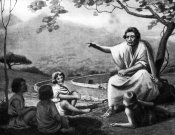
Worksheets and No Prep Teaching Resources
Reading Comprehension Worksheets
Ancient Greece

Ancient Greece
 Worksheets and No Prep Teaching Resources Reading Comprehension Worksheets Ancient Greece |
 Ancient Greece |
| edHelper's suggested reading level: | grades 4 to 6 | |
| Flesch-Kincaid grade level: | 5.41 |
|
Aesop and His Fables
By Vickie Chao |

|
 1 Aesop was a famous Greek storyteller. But he was also a legendary figure. For centuries, scholars have tried to figure out if he had actually existed. Some believe he did. Others think he did not. For those who believe he did, they could not say for sure where he had come from. They also could not say for sure when he was born. Among the various theories, one claimed that Aesop was once a slave in the 6th century B.C. After he was freed, he became an advisor to Croesus, the King of Lydia. One day, Croesus sent Aesop to a city called Delphi. He gave the famous storyteller a large sum of gold and asked him to distribute it among the citizens there. But for whatever reason unknown to us, Aesop did not give out the money. Filled with anger, the citizens of Delphi killed him.
1 Aesop was a famous Greek storyteller. But he was also a legendary figure. For centuries, scholars have tried to figure out if he had actually existed. Some believe he did. Others think he did not. For those who believe he did, they could not say for sure where he had come from. They also could not say for sure when he was born. Among the various theories, one claimed that Aesop was once a slave in the 6th century B.C. After he was freed, he became an advisor to Croesus, the King of Lydia. One day, Croesus sent Aesop to a city called Delphi. He gave the famous storyteller a large sum of gold and asked him to distribute it among the citizens there. But for whatever reason unknown to us, Aesop did not give out the money. Filled with anger, the citizens of Delphi killed him. |
Create Weekly Reading Books
Prepare for an entire week at once! |
| Leave your feedback on Aesop and His Fables (use this link if you found an error in the story) |
 |
Ancient Greece
|
 |
Social Studies
|